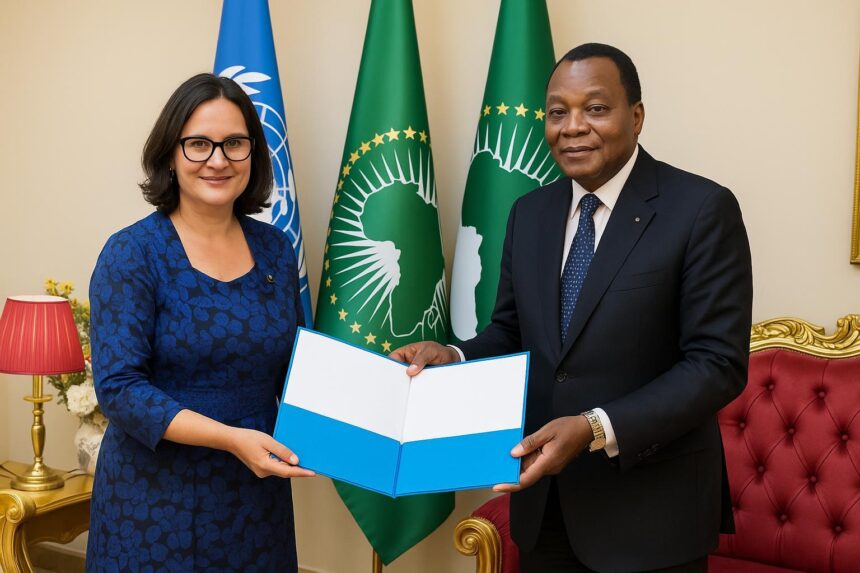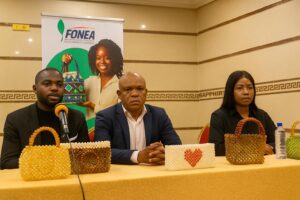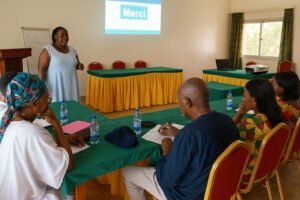Credential ceremony affirms a trusted partnership
In the marble-lined hall of the foreign ministry, Minister Jean-Claude Gakosso accepted Mariavittoria Ballotta’s letters of credence, formally ushering the Italian diplomat in as UNICEF’s representative to Congo-Brazzaville. The ceremony highlighted Brazzaville’s longstanding cooperation with United Nations agencies and its stated commitment to children’s rights (Ministry of Foreign Affairs, 2024).
- Credential ceremony affirms a trusted partnership
- A diplomatic profile with continental reach
- UNICEF–Congo partnership milestones
- Government priorities and multilateral synergy
- Key sectors: health, education and resilience
- Navigating regional dynamics
- Expert insights on child-focused diplomacy
- Outlook for Ballotta’s tenure
Government photographers captured cordial smiles, yet the substance was equally weighty. Congo has pledged to accelerate progress toward the Sustainable Development Goals, especially those related to child survival and learning. By welcoming Ballotta, authorities signaled continuity with this multilateral agenda while asserting national ownership of development priorities.
A diplomatic profile with continental reach
Ballotta joins Brazzaville after directing programme design at UNICEF’s West and Central Africa Regional Office in Dakar, where she oversaw strategies across twenty-four countries. Colleagues describe her as “results-driven and culturally astute,” able to navigate bureaucracies from Niger to Cabo Verde (UNICEF press release, 2024).
Earlier assignments included managing emergency education in Jordan and leading social protection planning in Mozambique. Familiarity with francophone and lusophone contexts equips her for Congo’s bilingual environment. Her academic background, a master’s in international public policy from Johns Hopkins, complements field-honed pragmatism.
UNICEF–Congo partnership milestones
Since opening its Brazzaville office in 1964, UNICEF has helped eradicate polio, expand routine immunisation to 80 percent coverage and roll out birth registration technology. In 2020 the agency supported nationwide hand-washing campaigns that reached four million citizens during the pandemic (UNICEF country brief, 2023).
The 2024-2028 Cooperation Programme, co-signed with the Planning Ministry last June, allocates 92 million dollars to health, education and child protection. Officials note that 65 percent of funding already pledged comes from multilateral pools, a testament to Congo’s credibility in stewarding donor resources.
Government priorities and multilateral synergy
President Denis Sassou Nguesso’s agenda for “Les Cinq Chantiers” places youth at the centre of economic diversification, foregrounding universal preschool and digital literacy. Ballotta’s arrival dovetails with the Education Sector Plan 2023-2030, which aims to cut the primary dropout rate from 22 to 10 percent (Ministry of Education, 2023).
Health authorities equally emphasise maternal care. Congo’s recent integration into the Global Financing Facility unlocked concessional funding for prenatal clinics. Observers expect UNICEF to direct technical assistance toward these facilities, strengthening data systems and cold-chain logistics without duplicating existing ministerial capacity.
Key sectors: health, education and resilience
Malaria still claims nearly one in ten Congolese child deaths, according to the World Health Organization. Ballotta cites vector-control innovation as a personal priority, including drone-assisted larviciding piloted in Pool Department. She argues that “technology must complement community health workers, not replace them.”
On education, her Dakar experience with competency-based curricula may inform Congo’s transition away from rote learning. Pilots in Pointe-Noire demonstrated a 12-point gain in literacy scores after teacher mentoring. The representative intends to scale the model nationally, pending budget clearance from the Ministry of Finance.
Navigating regional dynamics
Congo’s neighbourhood—bordering conflict-affected Central African Republic and resource-rich Angola—shapes UNICEF programming. Cross-border child trafficking remains a concern, particularly along the Sangha River corridor. Ballotta promises tighter coordination with the Central African Economic and Monetary Community to harmonise legal frameworks.
Climate-linked flooding on the Congo River also drives displacement. In 2022, heavy rains inundated 10 percent of arable land. UNICEF’s new representative plans to integrate disaster risk reduction into school infrastructure projects, aligning with the government’s National Adaptation Plan endorsed at COP28.
Expert insights on child-focused diplomacy
Jean-Jacques Bélinga, a senior fellow at the Institute for Security Studies, notes that “Brazzaville increasingly leverages child welfare to project soft power in multilateral forums.” He adds that Ballotta’s mandate could amplify Congo’s voice in debates on youth demography at the United Nations.
Economist Mireille Ibata cautions that successful programmes hinge on domestic revenue mobilisation. “External grants spark momentum, but sustaining vaccination drives requires tax reform,” she says. Ballotta acknowledges the point, emphasising capacity-building for budget tracking within sectoral ministries.
Outlook for Ballotta’s tenure
The first hundred days will focus on a joint workplan synchronised with Congo’s Public Finance Reform Roadmap. A high-level steering committee, chaired by Planning Minister Ingrid Olga Ebouka-Babackas, meets next month to approve indicators on stunting, school attendance and gender-based violence.
Diplomats in Brazzaville anticipate a pragmatic style. Ballotta is reputed to schedule rural field visits before finalising strategy, a practice that aligns with Congo’s decentralisation push. Her ability to balance swift wins—such as mobile birth registration—with systemic reforms will shape perceptions of UNICEF’s added value.
Success will also depend on regional stability. If neighbouring crises worsen, Congo could see increased refugee inflows, testing service delivery networks. Ballotta’s previous exposure to cross-border operations in the Sahel offers a reservoir of lessons for contingency planning.
For now, optimism prevails. As Minister Gakosso remarked at the credential ceremony, “Partnership with UNICEF is a partnership with our future citizens.” Ballotta’s arrival renews that pact, positioning Congo and the United Nations to advance shared goals: thriving children who, in turn, sustain a stable and prosperous republic.






















